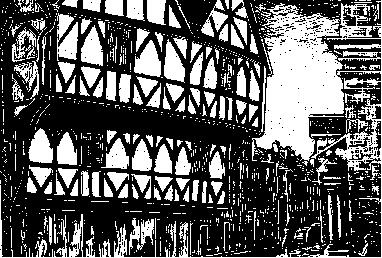
Deathwatch beetles are small beetles that eats oak and other ‘hard woods’. They got their name because people on the death watch (staying up all night praying by the dead body) could hear them eat wood.
Near the cathedral was a field where the populous practiced archery. The area was quite large since it was compulsory for everyone in the town to practice archery on Sundays. {Archery practice in Angels is the first Sunday of the month}
Within the cathedral are buried hearts and innards. If someone was famous enough to have their bodies moved for burial (i.e. royalty), the innards of the body will be removed and buried where the death occured. This was necessary since the journeys often took a while Think of the smell.
When residents of the town left their houses for an extended period, they would take their glass out of the windows and board it up. Glass was very expensive and often difficult to obtain.
There were some interesting individuals in town who devised one of the earliest pyramid schemes to get rich. Called the Palmers Guild, they had been to the holy land, and were qualified to pray for people’s souls. For a small donation of course. “What’s a few pence a week to save your soul for eternity?” Since the number of people who they could pray for was limitless, the Palmers guild quickly became rich. They used their wealth for investment, and became richer, and owned many properties. The Palmers Guild were a medieval force to be reckoned with. It was one of the many religious groups that was disbanded by Henry VIII.
Ludlow played an important role in English history, its importance in national affairs is reflected in the elegance and grandness of its castle. Ludlow castle was started in the late 11th century as the border stronghold of one of the marcher lords, Roger de Lacy. The Castle was one of a line of Norman castles along the Marches, built to pacify the countryside and hold back the unconquered Welsh. It was also used as a power base for the Irish conquest. Early in the 14th century, the castle was enlarged by Roger Mortimer, then the most powerful man in England. The last male Mortimer died in 1425 and Ludlow castle passed to his sister’s son, Richard Plantagenet, Duke of York, leader of the Yorkists in the War of the Roses. This affiliation brought new importance to Ludlow, but also resulted in it being taken and sacked by the Lancastrains in 1459. Ludlow became crown property in 1461, when Edward IV, son of the Duke of York, became king. It remained crown property for over 350 years.
In 1472, the King started a tradition by sending his son, the prince of Wales, to Ludlow to be raised away from the plagues and intrigues of London. The council that came with the princes evolved into the council of the marcher lords, and gradually assumed responsibility for the government of Wales and the border counties. For more than a century, Ludlow was virtually the capital of Wales.
During the civil war of 1642-46, Ludlow castle was a loyalist stronghold. In 1646, the town and castle were besieged, but surrendered. The castle went into rapid decay during the reign of William and Mary, when government was centralized to London. The decay was aided by local townsfolk who ‘borrowed’ materials from the castle for their own uses. (Some pieces were pointed out on the guided tour). Today the castle is a tourist attraction, and used for music festivals and sports events. I went to the castle as a tourist, and rented a tape to go on a self-guided tour. It lasted about an hour, but I turned it off often to do further exploring. Many things I did see. The gardrome shoot is the exit of the bottom of the seat in the gardrome. The pile that accumulates at the bottom of the gardrome shoot is taken away by a gong farmer in carts. Straw kept in a large bowl in the gardrome substituted for toilet paper. The place where the beerhouse stood was in the inner bailey. It was well known that females make the best brew. The kitchens of the castle were large, the remnants of fireplaces still exist. The tape told me how spit boys – young boys whose only job was to turn the spits, often did it naked. The chapel in the castle is built in a round Norman style. There are built-in chairs on the walls, but everyone else was expected to stand. This is where the saying “The weak must go to the wall” comes from.
Ludlow is a wonderful town, I would highly recommend visiting it for yourself. There are many other facinating features that I didn’t mention (like a different type of market almost everyday on the same spot it’s been since the 11th century). Next month I will be telling about Clun, the place where I have decided to base my personna.
Other Travels of Rowanna:
London|Shrewsbury|Ludlow|Clun|Cardiff|
|Chartres|Anjou & Angers|Cognac|Saint Emilion|Toulouse & Foix
